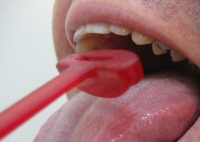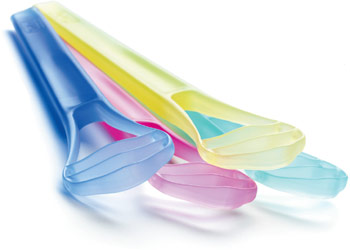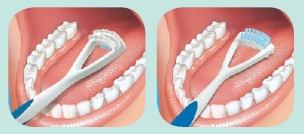Brushing your tongue may not be a common thing to do but this is one area where one should be incorporating in your oral hygiene regime. The tongue is a habitat for oral microorganisms therefore there is a potential need for tongue cleaning to be a part of our daily oral hygiene.
Tongue Cleaning
Tongue cleaning has been practiced since antiquity. Removal of dead tissues (debridement) on the tongue can help further reduce bacterial plaque beyond tooth brushing and cleaning in between teeth. The large papillary (tissue projections) surface area of the tongue dorsum favors the accumulation of oral microorganisms and oral debris. Anatomically, the shorter and the longer tissue projections create elevations and depressions that may entrap debris and harbor microorganisms, making the tongue an ideal location for bacterial growth. Oral debris from these sites may contribute to plaque formation in other areas of the mouth. Reduction of this debris by mechanical tongue debridement can affect plaque accumulation, and oral malodor.
What is a tongue cleaner?
A tongue cleaner is a dental device used to clean the food debris, bacterial build-up, fungi, and dead cells from the tongue surface. Various designs of tongue cleaners (also called a tongue scraper or tongue brush) are available. A soft-bristled toothbrush can also be used after the standard toothbrushing regimen. When using a tongue cleaner, the device is placed on the surface of the tongue close to the base of the tongue and pulled forward, pressing lightly against the surface of the tongue. This process is repeated to cover the entire surface area of the tongue.
Smokers or those with coated, deeply fissured tongues, or with elongated tongue tissue projections (hairy tongue) will find that tongue debridement (dead tissue removal) is especially beneficial in reducing oral bacteria.
Why clean your tongue?
To cleanse the mouth thoroughly, tongue brushing or cleaning should be incorporated for the surface of the tongue is a primary source of oral microorganisms. Tongue cleaning can reduce the number of these organisms in the mouth, improve taste perception and contribute to overall cleanliness. A clean tongue is also essential in reducing bad breath and keeping any infections at bay.
Bad breath and the Tongue
Oral malodor, another term for bad breath or halitosis, can have a systemic origin or may originate in the mouth. A thorough physical examination can rule out a systemic disorder. Usually odors in the mouth occur when sulfur-containing proteins and peptides are hydrolyzed by Gram-negative bacteria in an alkaline environment. Odiferous sulfur-containing end products created by this process include hydrogen sulfide, methylmercaptans, and dimethyl sulfide. A shift from a predominantly gram positive to a gram negative and anaerobic bacterial population is associated with odor production.
Local factors such as reduced salivary flow, and/or a rise in oral pH may affect this shift. Inconsistent or ineffective plaque removal in between teeth can provide a niche for gram negative bacteria to degrade sulfur-containing amino acids resulting in malodor.
The presence of gum or periodontal disease may also be a contributing factor since the inflammatory process creates substrates that stimulate bacterial growth.
Also, the putrefaction process and its concomitant odor occur more rapidly when bacterial accumulations on the tongue are high. Active periodontal disease, exhibiting deeper pockets, contributes to malodor. Thus, for some people, management of periodontal disease is an important aspect in the control of malodor.
Treatment considerations can include instruction in consistent tongue brushing or scraping since the back surface of the tongue seems to be a common site for production of volatile sulfur compounds. Additionally, the usage of a chlorine dioxide rinse, which oxidizes the malodorous sulfides has been shown to effectively reduce malodor.
Are there any side effects in tongue cleaning?
Some may experience a ‘gag reflex’ or the urge to vomit when cleaning their tongue. This may happen when certain sensitive areas on the tongue are touched or when the tongue cleaner or toothbrush is directed to far into the mouth. To avoid this complication, the tongue and muscles of the throat should be relaxed during cleaning.
Aggressive brushing the tongue or using an inappropriately designed tongue cleaner too much may cause damage to the taste buds present on the surface of the tongue. Using a safe ergonomic tongue cleaner carefully may avoid such circumstances.
How to decide whether to brush your tongue
Do you suffer from the following symptoms?
- Bad breath
- Having a coated tongue
- Having a deeply, fissured tongue
- Having a hairy tongue
Then you might need to start cleaning your tongue but if these symptoms still persist, it is best you visit your dental professional to determine the source of these problems.



